Summary
Analysis
Roy Cohn sits in his hospital bed, yelling on the phone. He seems to be having an argument about turning in his records to a “shitty little committee.” As Cohn claims that his records were “lost in a fire,” Ethel Rosenberg walks into the room. Cohn keeps arguing with the person on the other end of the phone, claiming, “I’ve never killed anyone.”
We see Cohn exactly as he was at the beginning of Part One—yelling on the phone. The difference, of course, is that now Cohn’s phone calls are more desperate and more urgent—he’s about to lose his bar license, and he knows it. This explains Ethel’s presence—she’s like an angel of death, prepared to take Cohn to Hell (and her presence is also an ironic rebuttal to his claim that he’s never killed anyone).
Themes
As Ethel Rosenberg sits in the room, Belize walks in, ordering Cohn to put down the phone so he can take his pills. Cohn yells, “Suck my dick, Mother Teresa,” and hits the pills out of Belize’s hands. Furious, Belize slams down the phone. Cohn begins to cramp up, and jokes, “Now I know how women feel once a month.” Cohn then asks Ethel Rosenberg about her friends in “Red Heaven.” Ethel doesn’t respond, and Belize doesn’t understand whom Cohn is talking to.
Cohn continues to show his hatred for Belize, even after Belize gives Cohn some useful advice about how to treat his condition. Cohn’s remark about menstrual cramps suggests that he really is losing the identity of conservative “manly man” that he’s crafted for himself. Ethel is another kind of “fantasy” in the play—she could really be there, or just a hallucination of Cohn’s.
Themes
Cohn boasts to Belize that he treats his disease with his own supply of AZT, which he keeps in a private fridge in his hospital bed. Belize is impressed—he points out that there are probably 30 people in the country who get AZT, even though there are 100,000 people who need it. Belize tells Cohn that he wants some of Cohn’s pills to take care of his friends. Cohn smirks and refuses.
Cohn smiles because Belize has just reminded him that Cohn still retains power and privilege that others (particularly most AIDS victims) lack. AZT is thus also presented as a symbol of how wealth and privilege affect every aspect of life—even proper healthcare, which should be something available to every human, but instead is denied to thousands of “outcast” AIDS victims.
Themes
Belize asks Cohn again and again for pills, and Cohn refuses, calling Belize a “nigger” and a “cunt.” Belize, furious, calls Cohn a “kike,” and Cohn immediately replies that Belize can have some of his pills. Belize takes ten bottles and leaves the room.
This scene suggests that Cohn measures power in his own way, and only gains some respect for Belize when Belize “sinks to his level” and uses racial slurs back at him.
Themes
Get the entire Angels in America LitChart as a printable PDF.

Cohn is now alone with Ethel Rosenberg. Ethel boasts that she’s going to watch Cohn’s disbarment hearing, which is coming up soon. Cohn laughs and calls Ethel a “bloodsucking old bat.” Cohn complains that the problem with Americans is that they don’t take care of the sick. For example, Ronald Reagan is in his 70s, but he’s as healthy as a horse. Cohn concludes, “This is no country for the infirm.”
Cohn’s remark about President Reagan has a sad poetry—as he sees it, America is a country about health, beauty, and strength. Cohn has spent his entire life helping the powerful stay powerful, but now he’s on the other side of the fence, an outsider staring in. The line “no country for the infirm” is probably also a reference to a line from a famous W.B. Yeats poem, “Sailing to Byzantium”: “This is no country for old men.”
Themes












